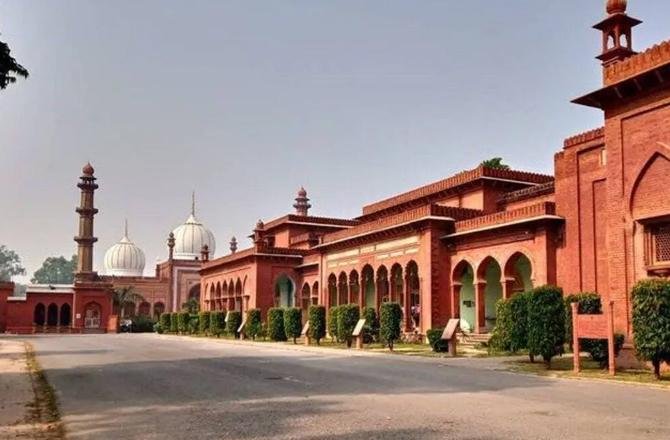By hosting the event, the university administration is essentially legitimising corporate involvement in militarised violence, says a student
Team Clarion
ALIGARH — Students at Aligarh Muslim University (AMU) staged a vociferous protest this week against a memorial event organised to honour late Indian industrialist Ratan Tata. The protest, which took place outside JN Medical College, was marked by students holding placards with slogans such as “Tata bye bye to those who supply arms to child killers” and “AMU stands with Gaza.”
The students voiced concerns over the Tata Group’s alleged involvement with the Israeli defence industry, citing this as a reason for the company’s indirect role in the ongoing Gaza conflict.
The event on Tuesday, organised in collaboration with AMU’s Department of Business Administration and the College of Medicine, was intended to celebrate Tata’s contributions to Indian industry and philanthropy. However, the event took a controversial turn when students began gathering outside the venue to protest, echoing sentiments raised by the “Tata Bye Bye” campaign led by activist group South Asian Left Activist Movement (SALAAM) based in New York. This campaign, in association with social justice organisations such as the Palestinian Youth Movement, No Tech for Apartheid, and Art Against Displacement, aims to pressure Tata Consultancy Services (TCS) and its parent Tata Group to sever ties with the Israeli military due to alleged human rights abuses in Gaza.
The protest at AMU saw participation from a large number of students, some of whom felt that honouring Tata in a minority institution contradicted the values of solidarity with oppressed communities. They argue that the university, as an institution known for its strong stance on social justice and minority issues, should not be seen as endorsing individuals or corporations allegedly tied to foreign policies or actions detrimental to any marginalised group.
Talking to Clarion India, a protesting student said “Celebrating Ratan Tata and his legacy here at AMU feels like a betrayal to our brothers and sisters in Gaza who suffer under military oppression. By hosting this event, the university administration is essentially legitimising corporate involvement in militarised violence.”
Another protestor added that such events could tarnish AMU’s image, particularly among those who see the institution as a beacon of support for international human rights.
University authorities intervened to keep the protesters outside the event hall. The proctorial team reportedly prevented students from entering the venue, which led to a heated exchange between the deputy proctor and several of the protesting students. The administration argued that the event was intended solely to commemorate Tata’s positive contributions to Indian society, not to endorse any alleged political or international affiliations.
Tata Group’s Alleged Role in Israel
The protests stemmed from claims that Tata Consultancy Services (TCS) is complicit in Israeli military projects, which some argue contribute to the technology and resources used by the Israeli Defence Forces (IDF) in Gaza. Tata Group has significant investments in Israel, and critics claim that these ties have provided support to IDF operations in conflict zones. Activist groups like SALAAM have consistently highlighted these issues, accusing TCS of benefiting financially from contracts that bolster militarisation and surveillance in conflict-prone areas.
Student activists at AMU referenced these accusations in their speeches, stating that the Tata Group’s international ventures create complex moral questions. A student leader at the protest stated, “It’s hard to reconcile Tata’s image as a philanthropic leader in India with its reported investments that fuel conflict and oppression abroad. We cannot ignore these contradictions.”
In a show of solidarity, several campus organisations issued statements echoing the protesters’ demands. AMU’s Human Rights Forum called for the administration to “reconsider” hosting memorials that honour individuals linked to contentious global issues. Similarly, the AMU Students’ Union released a statement accusing the administration of ignoring ethical concerns surrounding Tata’s legacy, stating, “When we honour figures with alleged ties to oppressive regimes, we risk undermining the principles of equality and justice that AMU stands for.”
Broader Implications
The protests at AMU reflect a broader movement within Indian universities, where students are increasingly vocal about issues of corporate responsibility, foreign policy, and human rights. Institutions like Jawaharlal Nehru University (JNU) and Jamia Millia Islamia have witnessed similar protests against alleged corporate complicity in global conflicts, with students urging transparency and ethical considerations in university collaborations and events.
The controversy over Ratan Tata’s memorial at AMU also raises questions about the extent to which academic institutions should distance themselves from figures or entities linked to global issues that may contravene the principles held by the student body. “Universities are places where we should be free to question the ethics of power structures, be they political or corporate,” said another AMU student protester. “Celebrating a person connected with these structures without acknowledging their consequences is counterproductive.”
The “Tata Bye Bye” campaign, inspired by growing international solidarity with Palestine, has garnered support from various global activist groups. SALAAM’s campaign has intensified after recent escalations in Gaza, with supporters in North America, Europe, and Asia calling for a boycott of Tata-affiliated products and services. Organisations like the Palestinian Youth Movement and No Tech for Apartheid have issued statements calling on global consumers to “re-evaluate their purchases and investments in companies tied to oppressive practices.”
In light of these events, some students at AMU have begun discussions about organising educational forums to further examine corporate complicity in global conflicts. They hope that these forums will allow students to debate and discuss ethical consumerism and the importance of supporting human rights worldwide.
As AMU students continue to voice their stance, similar protests could likely arise in other academic institutions. The issue not only reflects the concerns of today’s youth but also highlights the complexities involved in honouring prominent figures tied to international interests that may conflict with humanitarian principles.

